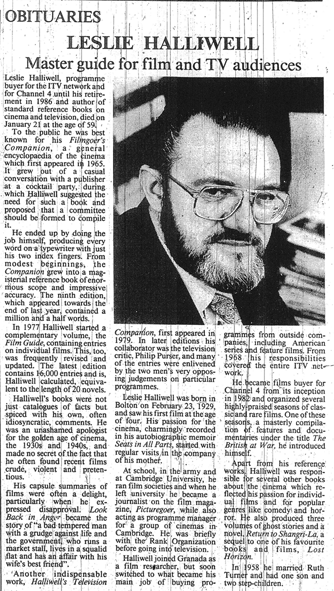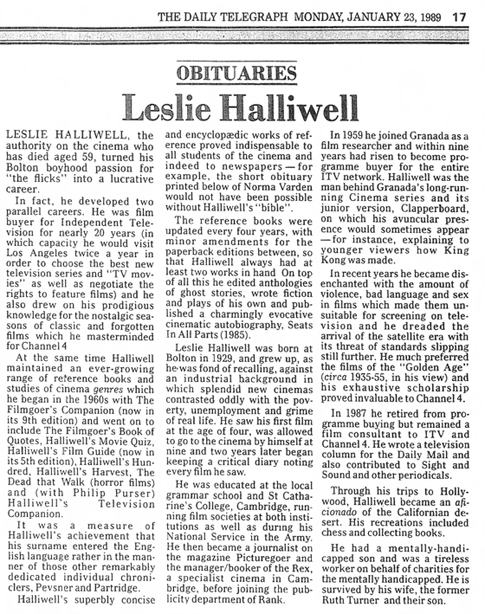| |
FOR a legion of film fans, the death of Leslie Halliwell on Saturday will come as a personal blow. For although they may never have met him, they will have felt they knew him. For he had become an indispensable part of their lives. He it was who provided the standard reference works, regularly updated, that enabled you to discover the birth date of Joan Crawford, the real name of Cary Grant or how many actors had played the Count of Monte Cristo, the kind of questions that regularly exercise the minds of film buffs.
But the facts were also laced with opinions, which you could check out against your own. “Forgettable leading man” was his description of one hapless American actor. When it first appeared in 1965, “Halliwell’s Filmgoer’s Companion” (now in its ninth edition) filled a real gap in film literature and it was later joined by – among others – “Halliwell’s Film Guide” and “Halliwell’s Television Companion”. As “Bradshaw” was for the 19th century – a generic name for an essential compendium of information.
It was to Halliwell that journalists and preview writers turned automatically for capsule verdicts on films. This ensured that his opinions reached an even wider audience than those who possessed his books.
For almost 20 years he was ITV’s chief buyer of films and mini-series. But he reserved his special enthusiasm for acquiring old films and when Channel 4 came into being he was able to schedule what in effect became a National Film Theatre in the home.
He decisively demonstrated the richness, breadth and artistic excellence of what highbrows often used to dismiss as “those awful old films”. For lovers of the golden age of the cinema like myself, Channel 4 became a source of unalloyed delight as time and again one encountered films one had only ever read about and never expected to see.
It must have given Halliwell particular pleasure to have been able to programme the long unseen complete versions of his childhood favourites, “Lost Horizon” and “Frankenstein”. But no rarity was beyond his range and he sedulously sought out such apparently lost films as “The Passing of the Third Floor Back” with Conrad Veidt and “Big Fella” with Paul Robeson.
His greatest love was for those genres most despised by highbrow critics – horror and slapstick comedy. He would regularly insert in the schedules – to the delight of fellow aficionados – the minor films of Tod Slaughter or Boris Karloff and the rough and tumble comedies of Frank Randle and Old Mother Riley. He also wrote about the genre with affection and erudition.
He was no academic film historian and was rather scornful of “the egghead student of film culture who shuns the commercial entertainments in favour of Middle European or Oriental masterpieces which never got further than a very few art houses”.
He was also out of sympathy with much modern cinema, writing in 1984: “I have not seen a new film for several years which can give the perennial thrill of a midnight revival of ‘Casablanca’ on the box.” He was in fact an amateur in the best sense of the word – a lover of the films of the golden age who sought always to share his enthusiasm, to win converts to the cause and to show today’s telly watchers the cinematic world they had lost.
He provided his greatest testament in his autobiography “Seats in All Parts”, published in 1985. Subtitled “Half a Lifetime at the Movies”, it was a vivid, heart warming recollection of a film-obsessed childhood in 1930s Bolton.
He indelibly recaptured that now half-forgotten world of uniformed commissioners and queues, the A picture, the B picture, and “full supporting programme,” the mighty Wurlitzer organ, buttered crumpets at the Odeon café, surreptitious visits to the “flea pit” or the “bug hutch”. It was a world dominated by such legendary deities as Laurel and Hardy, Nelson Eddy and Jeanette MacDonald, Marie Dressler and Wallace Beery, Tom Walls and Ralph Lynn, a world of innocence, warmth and certainty.
It became clear when reading the book that he had seen Channel 4 as a way of recreating for all of us the joys of that childhood in Bolton long ago when the silver screen had given him golden dreams. He was its chronicler, its champion and its celebrant. He will be irreplaceable.
|
|


